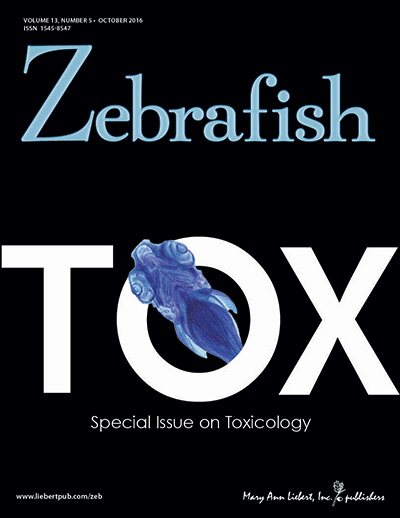Aims & Scope
Zebrafish is the only peer-reviewed journal dedicated to the central role of zebrafish and other aquarium species as models for the study of vertebrate development, evolution, toxicology, and human disease.
Due to its prolific reproduction and the external development of the transparent embryo, the zebrafish is a prime model for genetic and developmental studies. While genetically more distant from humans, the vertebrate zebrafish nevertheless has comparable organs and tissues, such as heart, kidney, pancreas, bones, and cartilage.
Zebrafish introduced the new section TechnoFish, which highlights these innovations for the general zebrafish community.
TechnoFish features two types of articles:
- TechnoFish Previews: Important, generally useful technical advances or valuable transgenic lines
- TechnoFish Methods: Brief descriptions of new methods, reagents, or transgenic lines that will be of widespread use in the zebrafish community
Zebrafish coverage includes:
- Comparative genomics and evolution
- Molecular/cellular mechanisms of cell growth
- Genetic analysis of embryogenesis and disease
- Toxicological and infectious disease models
- Models for neurological disorders and aging
- New methods, tools, and experimental approaches
Zebrafish also includes research with other aquarium species such as medaka, Fugu, and Xiphophorus.
Zebrafish is under the editorial leadership of Editor-in-Chief Stephen C. Ekker, PhD, Department of Biochemistry and Molecular Biology, Mayo Clinic; and other leading investigators. View the entire editorial board.
Audience: Molecular biologists, geneticists, cell biologists, reproductive biologists, and developmental biologists, among others.
Indexing/Abstracting:
- PubMed/MEDLINE
- PubMed Central
- Web of Science: Science Citation Index Expanded™ (SCIE)
- Scopus
- Current Contents®/Life Sciences
- Biological Abstracts
- BIOSIS Citation Index™
- Journal Citation Reports/Science Edition
- Aquatic Sciences and Fisheries Abstracts (ASFA)
- Zoological Record®
- EMBASE/Excerpta Medica
- EMBiology
- Chemical Abstracts
- ProQuest databases
- CAB Abstracts
- Global Health
- BenchSci

